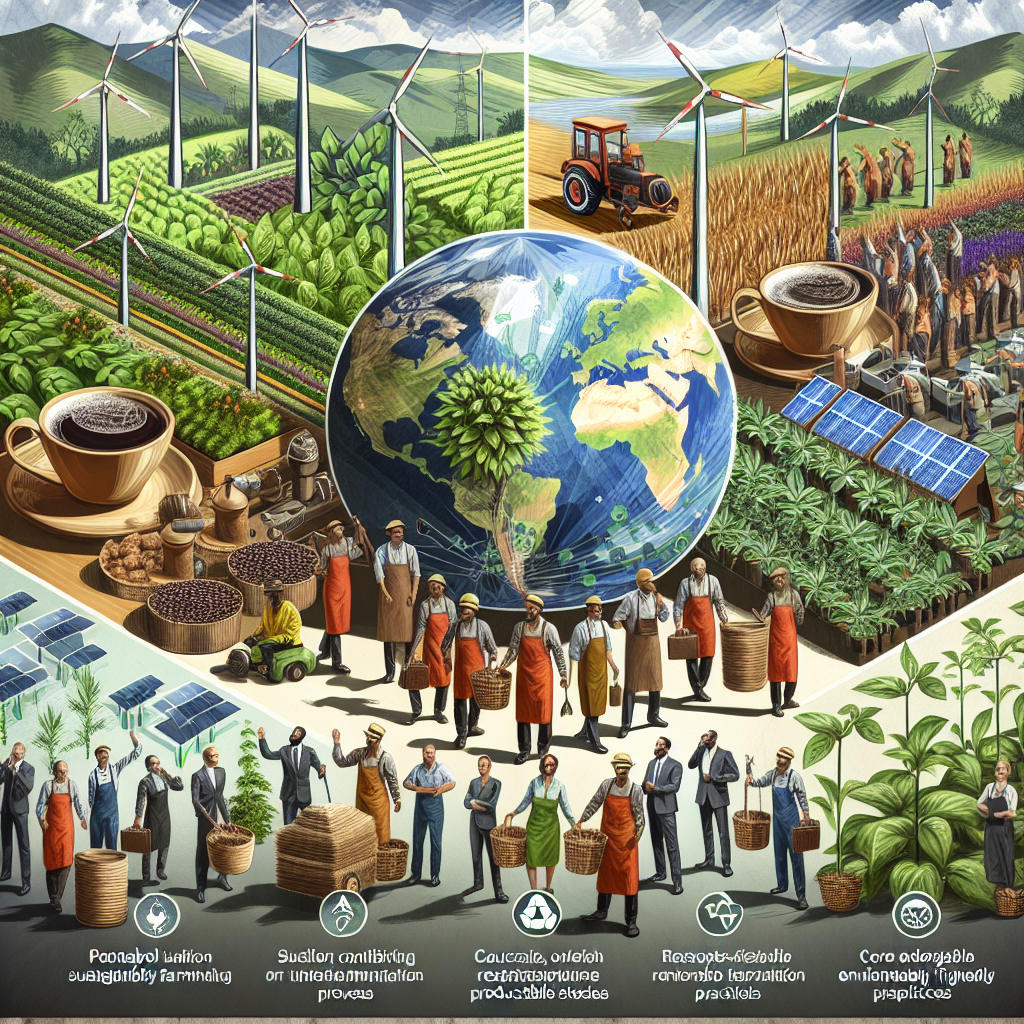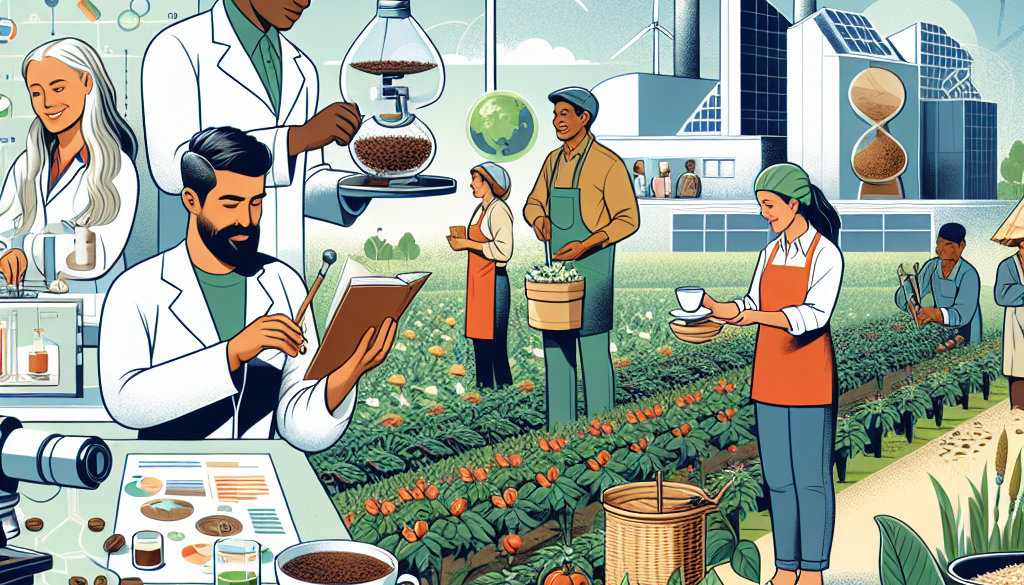Embracing Sustainability in the European Coffee and Tea Industry
-
Table of Contents
- European Coffee and Tea Industry: Pioneering Sustainability
- The Current State of Sustainability in the Industry
- Challenges and Opportunities
- Case Studies: Leading the Way in Sustainability
- Consumer Engagement and Education
- Regulatory Framework and Industry Standards
- Conclusion: The Path Forward for Sustainability
- Embrace Sustainability with ETprotein’s Products
European Coffee and Tea Industry: Pioneering Sustainability

The European coffee and tea industry is undergoing a significant transformation, driven by a growing awareness of environmental issues and consumer demand for sustainable practices. As one of the largest markets for coffee and tea, Europe’s influence on global sustainability efforts is substantial. This article explores the various initiatives and strategies that European coffee and tea companies are adopting to promote sustainability within the industry.
The Current State of Sustainability in the Industry
Sustainability in the coffee and tea industry encompasses a range of practices, from ethical sourcing and organic farming to reducing carbon footprints and packaging waste. European companies are at the forefront of this movement, with many setting ambitious goals to achieve sustainability.
- Organic and Fair Trade Certification: A growing number of European coffee and tea brands are sourcing their products from organic and fair trade-certified farms, ensuring that farmers receive a fair wage and work under good conditions.
- Carbon Footprint Reduction: Companies are investing in renewable energy, improving energy efficiency, and reducing transportation emissions to minimize their carbon footprint.
- Waste Management: Innovative packaging solutions, such as biodegradable or compostable materials, are being developed to reduce the environmental impact of product packaging.
- Water Conservation: Water-saving technologies and practices are being implemented in both the cultivation and processing stages of coffee and tea production.
Challenges and Opportunities
Despite the progress, the industry faces several challenges in its journey towards sustainability. Climate change poses a significant threat to coffee and tea crops, with changing weather patterns affecting yield and quality. Additionally, the cost of implementing sustainable practices can be a barrier for small-scale producers.
However, these challenges also present opportunities for innovation and collaboration. There is a growing market for sustainable coffee and tea products, and consumers are willing to pay a premium for them. This creates an incentive for companies to invest in sustainable practices and for governments to support the industry through favorable policies and subsidies.
Case Studies: Leading the Way in Sustainability
Several European companies have made headlines with their sustainability initiatives. For example:
- A major coffee brand has committed to making all of its packaging recyclable or compostable by 2025.
- A tea company has launched a range of carbon-neutral products, offsetting emissions through reforestation projects.
- A coffee roastery uses bioenergy from coffee waste to power its operations, significantly reducing its reliance on fossil fuels.
These case studies demonstrate the innovative approaches European companies are taking to address environmental concerns.
Consumer Engagement and Education
Consumer demand is a powerful driver of sustainability. European coffee and tea companies are engaging with consumers through marketing campaigns that highlight the benefits of sustainable products. Education initiatives are also crucial, as they inform consumers about the environmental impact of their choices and how they can contribute to sustainability efforts.
Regulatory Framework and Industry Standards
The European Union has been instrumental in promoting sustainability through regulations and standards. The EU’s Green Deal and Farm to Fork Strategy set out ambitious targets for reducing emissions and promoting sustainable agriculture. Industry standards, such as the Rainforest Alliance and UTZ certifications, provide guidelines for sustainable production and sourcing.
Conclusion: The Path Forward for Sustainability
The European coffee and tea industry’s embrace of sustainability is a positive step towards a more environmentally friendly future. By continuing to innovate, engage consumers, and work within regulatory frameworks, the industry can make a significant impact on global sustainability efforts. The key takeaways for the industry include the importance of certification, reducing carbon footprints, managing waste effectively, conserving water, and engaging consumers.
Embrace Sustainability with ETprotein’s Products
In line with the sustainability efforts of the European coffee and tea industry, ETprotein offers a range of organic bulk vegan proteins and L-(+)-Ergothioneine (EGT) that can enhance the nutritional profile of beverages while adhering to sustainable and ethical practices. Their non-GMO, allergen-free products with high purity levels are ideal for companies looking to innovate within the sustainable beverage space.
About ETprotein:
ETprotein, a reputable protein and L-(+)-Ergothioneine (EGT) Chinese factory manufacturer and supplier, is renowned for producing, stocking, exporting, and delivering the highest quality organic bulk vegan proteins and L-(+)-Ergothioneine. They include Organic rice protein, clear rice protein, pea protein, clear pea protein, watermelon seed protein, pumpkin seed protein, sunflower seed protein, mung bean protein, peanut protein, and L-(+)-Ergothioneine EGT Pharmaceutical grade, L-(+)-Ergothioneine EGT food grade, L-(+)-Ergothioneine EGT cosmetic grade, L-(+)-Ergothioneine EGT reference grade and L-(+)-Ergothioneine EGT standard. Their offerings, characterized by a neutral taste, non-GMO, allergen-free attributes, with L-(+)-Ergothioneine purity over 98%, 99%, cater to a diverse range of industries. They serve nutraceutical, pharmaceutical, cosmeceutical, veterinary, as well as food and beverage finished product distributors, traders, and manufacturers across Europe, USA, Canada, Australia, Thailand, Japan, Korea, Brazil, and Chile, among others.
ETprotein specialization includes exporting and delivering tailor-made protein powder and finished nutritional supplements. Their extensive product range covers sectors like Food and Beverage, Sports Nutrition, Weight Management, Dietary Supplements, Health and Wellness Products, and Infant Formula, ensuring comprehensive solutions to meet all your protein needs.
As a trusted company by leading global food and beverage brands and Fortune 500 companies, ETprotein reinforces China’s reputation in the global arena. For more information or to sample their products, please contact them and email sales(at)ETprotein.com today.














